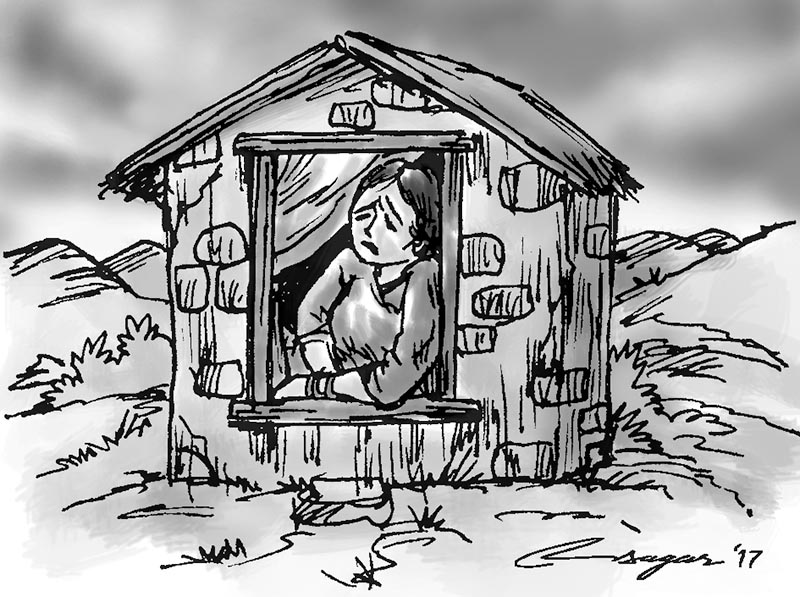OP-ED: Ending chhaupadi system: Comprehensive approach required
Date:
Author: Valerie Julliand, Giulia Vallese and Wenny Kusuma
Legislation matters. The laws a society passes speak of the values the society wishes to embrace. Nepal, through its laws and policies, shows clear aspiration to be a country governed with respect for human rights, equality and dignity for all
The recent deaths of several young women, banished to cow sheds during their menstruation and exposed to the elements and to snakebites, have shocked and horrified the public not only in Nepal but also abroad. We are all outraged, and rightly so: these deaths were tragic, unnecessary and utterly preventable, and there cannot be any justifications (moral, religious, cultural or other) for such practices.
Less frequently reported but equally distressing, is the fact that new mothers are secluded after childbirth, often depriving them and their newborns of adequate post-natal care and nutrition, and exposing them to danger at the most vulnerable times in their lives.
In 2005 the Supreme Court of Nepal issued a directive to the Nepal government for the formulation of laws to eliminate chhaupadi. There are valid and important reasons to legislate this issue and the Government of Nepal should be commended for seeking to address it.
Much of the commentary following the Parliament’s passing of the criminal code bill has centered on enforcement of the law. Many have argued that rigorous enforcement is essential; others have pointed out that chhaupadi is challenging to prosecute: will law enforcement go door to door asking women about their menstruation practices, carried out in the privacy of their homes? And while the law states that no person may force a woman to practice chhaupadi, it remains true that many women themselves comply with the practice, having internalized the beliefs about impurity that justify this discriminatory practice.
Beyond the practicalities of law enforcement, however, the practice of chhaupadi requires a more comprehensive approach than legislation alone can ever provide. Mindsets also have to change, not only the law.
Chhaupadi is practiced in many forms, most of which are far less extreme than banishment to a shed in the freezing cold. These diluted ‘modern’ forms of the practice may not put women and girls in immediate danger of their lives, but they are nonetheless both practical and psychological obstacles to women’s empowerment and equal and meaningful participation.
In practical terms, women and girls are excluded from key community activities every month. This may affect their education, their ability to contribute productively, their income and their representation and leadership in decision making in the home and community.
Psychologically, being considered dirty and impure, and the internalization of the discrimination this entails, is a powerful force in keeping women on the margins. Being untouchable during certain times every month, being considered unfit to prepare food for loved ones due to ‘impurity’, and having to eat and sleep separately for fear of polluting others, are factors in perpetuating a system in which women and girls are deemed of lesser worth.
The solutions, we believe, lie in programmes and initiatives that empower women to promote their ability to take on their rightful place in society, and to embrace the many capacities and productive and creative resources they represent. Intergenerational dialogues to address discriminatory socialization patterns can help, as can a variety of interpretations of religious texts, to break the vicious circle of myths.
This includes keeping girls – and boys – in school for longer, and improving the quality of their curriculum and their ability to question and to think for themselves. It involves providing them with age appropriate comprehensive sexuality education which helps them to understand the onset of puberty and the natural processes they will experience. It involves targeting adolescent girls with useful, practical, accurate information and advice to help them navigate this time of their life with facts and confidence rather than with myths and misconceptions. It requires availability of low-cost sanitary pads and access to water. It requires an end to the illegal marriages of young girls who are often powerless to negotiate and argue for themselves within a family of in-laws. And it involves helping to nourish a diverse set of role models for girls and boys – Nepali women and men from different backgrounds and from all walks of life, who seek to end harmful practices and advocate for substantive equality.
Ending chhaupadi means promoting better access to health and multi-sectoral services which can empower girls and women to be comfortable with their own needs, and to seek help when these are not met. Empowered women will more easily speak up in the face of violence and oppression, and often a well-qualified health or social worker will be their first stop in seeking support.Furthermore, both male and female leaders, decision makers and influencers must step up and speak for themselves and for other women. With federalization, a wonderful opportunity exists for the proliferation of greater female leadership at local level. This will ultimately begin to chip away at harmful practices – including chhaupadi. As always, men and boys as allies in promoting change are indispensable, be they husbands, fathers, religious leaders, or politicians.
Legislation matters. The laws a society passes speak of the values the society wishes to embrace. Nepal, through its laws and policies, shows clear aspiration to be a country governed with respect for human rights, equality and dignity for all. Truly changing norms and attitudes requires more, together with a strict application of the law. Women and girls should not be made to continue to suffer. Cow sheds aren’t for women.
About the authors
Valerie Julliand is Resident Coordinator of the United Nations in Nepal, Giulia Vallese is Representive for UNFPA Nepal and Wenny Kusuma is Representative for UN Women Nepal. The OP-ED originally published on The Himalayan Times | Archived
